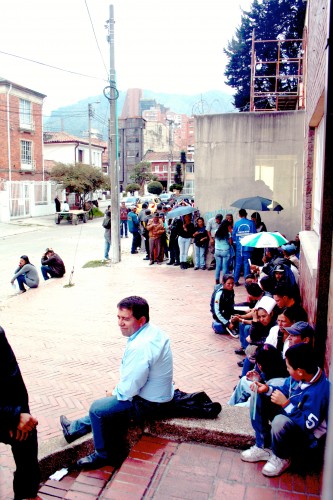By Federico Parra, Regional coordinator for Latin America, Waste Picker Program, WIEGO
After over 20 years of fighting for recognition and inclusion in the city’s waste management system, the organized waste pickers of Bogota finally saw their dreams come true when the Bogotá government issued them in March of this year their first payment for the collection and transportation of recyclable materials. It was the first time they were paid as public service providers to the city.
This victory cannot be explained without looking back at the ongoing struggle of the Asociación de Recicladores de Bogotá (ARB) for waste pickers’ rights and livelihoods. Their strategies have included numerous legal claims, demonstrations, support from legal advocacy groups and communication campaigns to both prevent private firms from monopolizing waste management in the city and to be recognized as an integral part of that system.
The strategic decision to use the judiciary system has proven to be a successful means of reaching these goals. Since 2003, the Constitutional Court has issued various resolutions and orders recognizing waste pickers as subjects of special state protection. The Court has also acknowledged that to overcome poverty and waste pickers´ vulnerability, municipal authorities need to recognize and remunerate them as service providers in the collection and transportation of waste, and that attention should be given to the strengthening of their organizations and their entrepreneurial potential.
But despite these guidelines, until the end of 2011, the Bogotá government continued to opt for a welfare approach that was not helpful in the empowerment of the waste pickers. They continued to be excluded from the public waste management system. That’s why in 2011, the Bogotá court strongly intervened by issuing Order 275, providing municipal authorities with clear instructions to ensure that waste pickers would be included in the waste management system. In response to the court order, the current municipal government developed a transition model of inclusion, divided into two phases. The first phase is made up of the following five steps:
- The development of a census of waste pickers in Bogota to define who will benefit from these policies. A post-census process will need to be put in place to incorporate people who were excluded.
- The development of a campaign for waste separation at source. Waste pickers would be in charge of collecting these recyclable materials.
- The certification of private warehouses where materials submitted by waste pickers would be officially weighed and registered.
- Access and inclusion to simple banking services for waste pickers, under which all the people counted in the census and included in phase 1 of the initiative would have a personal bank account. Payments for services provided between December 12, 2012 and the end of February 2013 would be deposited in these accounts.
- Payment to the 790 – of the 4,000 incorporated into the newly established banking system – waste pickers on March 21, 2013. Payment was calculated at a rate of 87,000 Colombian Pesos (about $48 USD) per ton collected and transported and is equivalent to the rate paid to private operators for tonne of waste transported and disposed of in the landfill. The money to pay for these services comes out of the cleansing fee charged by the city of Bogota. The only difference is that now instead of being directed in full to private or cleansing companies, this fee is shared as well with the service providers in the areas of collection and transportation of recyclables – namely, waste pickers.
The process of inclusion is an ongoing one. To date, there are 14,400 waste pickers registered in the census. Further efforts need to be made to incorporate them into the banking sector, and to increase the number of official points to weight and register for the payment transfers. In addition, many waste pickers lack proper IDs. The District Capital Administration has begun to resolve this issue.
Phase 2 of the process will consist in the strengthening of existing waste pickers’ organizations and their entrepreneurial skills on one hand, and promoting the creation of new organizations on the other. An additional benefit of this process is that any waste picker in Colombia, living in poverty and vulnerable conditions and where there is a public or private waste management system, can now demand the same treatment that was granted to waste pickers in Bogota. This means that:
- Waste pickers shall be an integral part of the public cleansing service’s collection and transportation of recyclables, and
- Waste pickers’ organizational and entrepreneurial abilities to provide these services, as well as their due payment are key pathways in which municipal authorities seek to enable them overcome their poverty and vulnerable conditions.



Tweet




